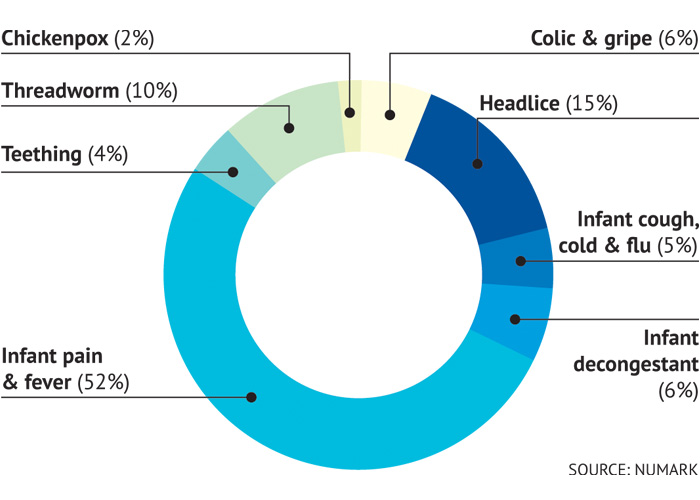In Families
Follow this topic
Bookmark
Record learning outcomes
Pharmacists have a unique opportunity to build trusting relationships with parents to influence the long-term health prospects of their children. Find out the most important ways you can get involved
The Royal College of Paediatrics & Child Health’s State of Child Health 2020 report is a snapshot of the health and wellbeing of children and young people, and a useful overview of the main health concerns and areas where improvements are being seen.
Particular areas of concern include immunisations, with rates decreasing throughout the UK, and childhood obesity, which continues to rise. Drug consumption is increasing, although alcohol usage is falling. Mental health issues and suicide rates have increased significantly, as has child poverty.
Improvements have been seen in smoking rates, teen pregnancies, hospital admissions for asthma and epilepsy, and type 1 diabetes control. The RCPCH report has three key areas of priority for the Government:
- Reduce child health inequalities. The report uncovered a widening gap between the health of children from wealthy and deprived backgrounds. It recommends a crossdepartmental national child health and wellbeing strategy to address this, with a focus on the first 1,000 days of life.
- Prioritise public health, prevention and early intervention. The RCPCH wants the government to restore £1 billion of cuts in public health funding for local authorities, with future spending allocated on population health needs.
- Build and strengthen cross-sector services to reflect local need. Children and young people should have equal access to these services and support in their local community. Preventing ill health Early intervention in childhood fosters healthy behaviours for life in crucial aspects such as healthy weight, diet and oral health, the report says.
Particular areas of concern include immunisations, with rates decreasing throughout the UK, and childhood obesity, which continues to rise
Immunisations
The rate of immunisations has gone down throughout the UK since the last State of Child Health report in 2017. The 6-in1 vaccination is down to 92.1 per cent in England (from 94.2 per cent), 95.4 per cent in Wales (96.6 per cent), 95.9 per cent in Scotland (97.4 per cent) and 84.8 per cent in Northern Ireland (97.3 per cent). Rates of MMR immunisation have continued to reduce, down to 86.4 per cent in England, 92.2 per cent in Wales, 91.2 per cent in Scotland and 91.8 per cent in Northern Ireland.
The report says we need a greater understanding of the reasons why children are not vaccinated. Research suggests only 1-2 per cent of parents refuse all vaccinations, with lack of easy access to services, cost of travel to services and competing demands on parents’ time contributing to reducing rates.
Pharmacy staff can help by:
- Learning more about the benefits of vaccinations and communicating these to parents
- Using opportunities to talk to parents about vaccination history and signposting them to services for routine and catch-up vaccinations
- Addressing parents’ concerns about immunisations and dispelling myths and misunderstandings.
Healthy weight
In 2018/19, 22.6 per cent (up from 21.9 per cent) of four to five year olds in England were overweight or obese, compared with 26.4 per cent in Wales (26.1 per cent), 22.4 per cent in Scotland (21.8 per cent) and 26.1 per cent in Northern Ireland (25.1 percent). In England, the most deprived four to five year olds were 1.6 times more likely to be overweight than the least deprived.
“Obesity needs to be a constant topic of conversation in healthcare, although it is a sensitive subject. Pharmacists alreadyhave a rapport with families,” says Lucy Upton, specialist paediatric dietician at Birmingham Children’s Hospital.
“Offering a weight and measure service is really helpful if youhave the equipment as families can easily return for regular checks. It’s important to know how to interpret the information as children are still growing.”
Alex White, assistant nutrition scientist at the British Nutrition Foundation, says: “Pharmacists are in a great position to support with weight management. Even short conversations duringroutine appointments can be beneficial. It’s a good idea to befamiliar with local weight control services so you can suggest these, where appropriate.”
The RCPCH welcomes the Government’s plan to halvechildhood obesity by 2030 and would like to see improved
accessibility and availability of weight management servicesfor children and young people. “Family interventions are going to be important in halving obesity, but the early years are theopportunity for pharmacists to get involved as it is the stage where you see parents frequently. Withformula milk sales, for example, you can talk to parents about the importance of correct dosage as over feeding is a big issue,” says Lucy Upton, adding that multivitamin enquiries can be linked intoconversations about weight and diet.
Alex White says: “There are many factors that affect a child’s risk of becomingobese, but addressing diet and physical activity are key. Conversations around this can be initiated by pharmacists.”
Lucy Upton says the most important messages to pass on to your customers are:
- Portion size is crucial. Around 70 per cent of parents overestimate the amount their child needs
- Children are good at self-regulating what they eat
- Approach a balanced diet as a family. You can’t expect children to eat healthily if adults don’t
- Keep an eye on sedentary behaviour - get children outside and exercising
- Take care how you discuss weight and diet around children - a positive attitude to food is important.
Pharmacists are in a great position to support with weight management. Even short conversations during routine appointments can be beneficial
Oral health
In 2018/19, some 2.8 per cent of children aged 0-5 had a tooth extraction due to decay in England, compared with 1.7 per cent in Wales and 2.3 per cent in Scotland. Tooth decay has been the most common reason for hospital admission in children aged five to nine for the last three years. Children from deprived areas have twice the level of decay compared with the least deprived.
The RCPCH would like to see:
- National oral health strategies for children and young people across the UK
- Good oral hygiene encouraged by distribution of free tooth brushing packs to at risk families, and toothbrushing schemes in schools
- Levels of sugar-free content in infant foods reviewed
- More widespread water fluoridation
- A review of access to dental care.
Dr Nigel Carter OBE, chief executive of the Oral Health Foundation, says: “The core of what you can do is education. The key to reducing childhood decay is twice daily brushing with a fluoride toothpaste and pharmacists are best placed to give this advice. It’s also important to encourage a three-monthly change of toothbrushes.”
Children are still consuming too much sugar. A recent UK study found that children as young as 10 have already consumed 18 years’ worth, says Dr Carter. He says one of the best things you can do to help is get involved in campaigns such as National Smile Month (18 May to 18 June), which “delivers key oral health information in a fun and positive way”.
Build a better child health category
- “One of the most popular areas we see parents asking advice about is skin care, especially ringworm, acne, eczema and dry skin conditions. A good range needs to include products required by younger customers. Other areas to look at include dental care, vitamins and allergy,” says Alphega’s Richard Janes.
- “Customers will recognise visual triggers from brands such as Calpol, Nurofen for Children and Hedrin. Position these prominently to attract customer attention. An own brand alternative alongside leading brands lets customers know they can opt for a value alternative,” says Numark’s Cathy Crossthwaite.
- “Separate subcategories out to make it easier for customers to browse – position pain and fever at eye level to make it easier to locate. Think about age suitability, formulation, strength and brand,” adds Ms Crossthwaite.

Mental health
In England, the percentage of children aged five to 15 reporting a mental health disorder has risen to 11.2 per cent. In a clear link, the suicide rate among young people aged 15-24 has risen in every part of the UK.
The prevalence of mental health disorders rose faster among older children – up to 13.5 per cent among 11-15 years olds, and 16.9 per cent among 17-19 year olds. The biggest increase is in emotional disorders (anxiety, depression, OCD, phobias), especially in women aged 17-19, with 22.4 per cent now affected.
Pharmacy staff can help by:
- Recognising signs of mental health issues in order to signpost young people or refer to appropriate services
- Undertaking training in mental health issues to improvedealings with young people
- Advocating for mental health of local young people
- Encouraging integrated working.
How can pharmacy staff help?
Richard Janes, head of retail for Alphega Pharmacy, says: “Pharmacy staff build strong relationships with customers. New parents particularly look for expertise and an opinion they can trust when seeking advice. We are seeing a rise in parents addressing more of their child issues at a community pharmacy rather than their doctors’ surgeries. Positively, we’ve seen a trend towards more awareness of wellbeing and prevention, and this is reflected in popularity of the vitamins and supplements category. He says Alphega pharmacy teams are also being approached by teens pre-university or college to check out what vaccinations they might need. “Meningitis B immunity is often overlooked when meningitis ACWY vaccinations are routinely offered to students,” he says. “Offering vaccination services and advice is a way community pharmacy can increase professional services as well as drive future footfall.”
At Numark, OTC business development executive Cathy Crossthwaite says the children’s health category holds approximately 8 per cent of the medicines sector. “Parents take much more care when choosing the right medicines for their children and so are more likely to come to pharmacy for one to one support. Go the extra mile and offer to show the parent how to take the child’s temperature accurately, for example, and answer any questions. This helps build a trusting relationship.”
Views from the P3pharmacy category panel
Sarina Mughal Day Lewis, London SW1
“Children’s health is more important than teen health for us. We don’t get many queries about acute conditions, except for fever and post-vaccine fever, but we get a lot of enquiries about multivitamins as many children are fussy eaters. Children’s gummies are popular for multivitamins or vitamin D. We also sell lots of vitamin D mouth spray as children like these better than tablets. Our BetterYou vitamin D spray and Nature’s Plus Gummies do well. Stock a variety of formulation types with packaging that appeals to children. Stock vitamin D near the till and place multivitamin syrups near the winter health care range.”
Lila Thakerar Shaftesbury Pharmacy, Harrow
“Not that popular for OTC sales, but we get a lot of children’s prescriptions here. Most of the enquiries from parents are about multivitamins for younger children. For older children, they ask about different formats such as chews, sprays, etc. The Health Aid brand is very popular, as is
Sanatogen, Value Pack and Redoxon. The trend for vitamin D is still growing, and more so during the pandemic as children are not able to spend as much time outdoors. We’ve also seen an increase in demand for vitamin C to boost immunity against infection. We put our C and D vitamins on the counter next to the hand sanitiser and gloves to prompt purchases.”
Gareth Evans Wansford Pharmacy, Peterborough
“We’re a small rural pharmacy so we have limited space for stock, but with no supermarket nearby, our sales are consistent. We’d stocked up on Calpol before the virus took hold as it’s harder to get now. We’d already ordered hay fever remedies too. We get asked a lot about conjunctivitis – we are closely linked and attached to a GP surgery. We often explain to parents why antibiotics are not always necessary. We refer teens for EHC and we have conversations with them about contraception too. Calpol and Nurofen for children sell really well. We have limited space to display and


